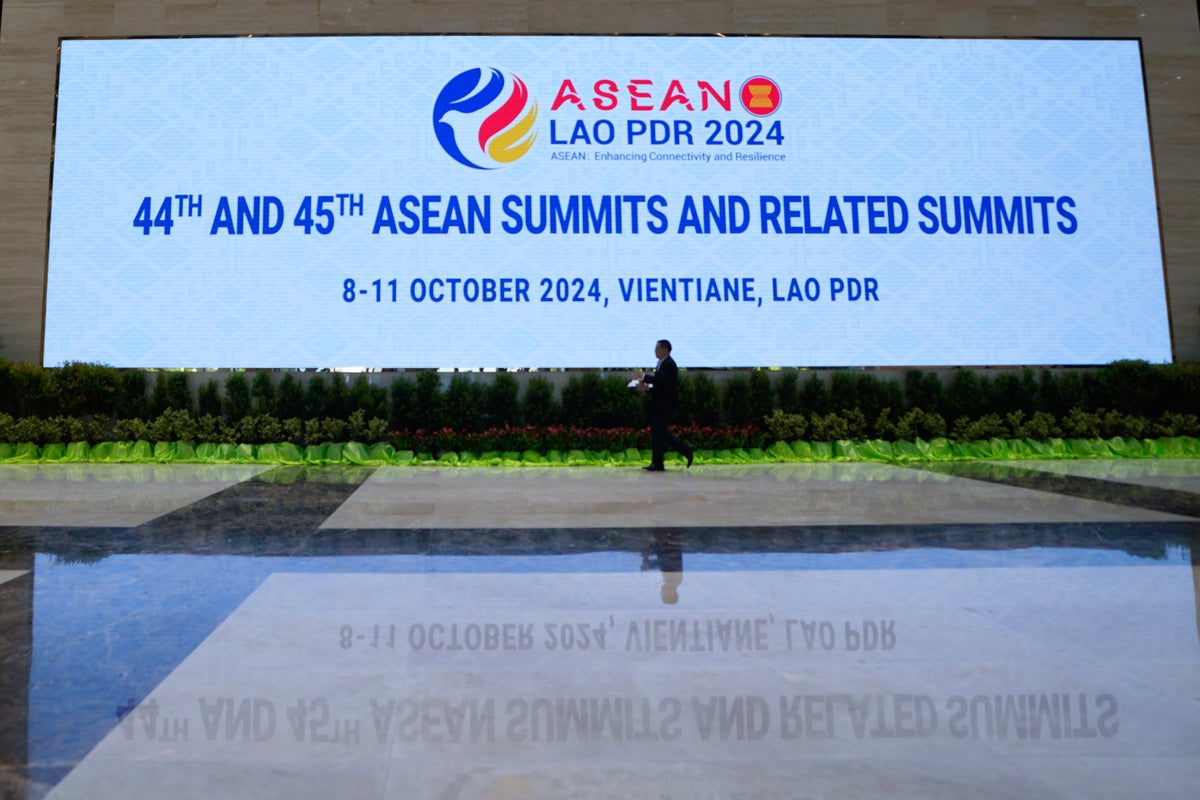
Your support helps us to tell the story
Southeast Asian leaders gathered in the capital of Laos on Wednesday for an annual regional forum that will focus on tackling the prolonged civil war in Myanmar and territorial tensions in the South China Sea.
The Association of Southeast Asian Nations summit will also be followed by meetings with global powers including China, the United States and Russia, which are contending for influence in the region.
The timing of the meetings in Vientiane makes it likely that talks will also touch on the escalation of violence in the Middle East, although Southeast Asia has faced only indirect fallout.
ASEAN's influence has historically been limited even among its own members, but the forum has often served as a platform for dialogues among superpowers looking to engage with the region.
The 10 member states of ASEAN — Indonesia, Thailand, Singapore, Philippines, Vietnam, Malaysia, Myanmar, Cambodia, Brunei and Laos — will also hold talks with their dialogue partners from elsewhere in the region including Japan, South Korea, India and Australia on topics ranging from the economy, to climate change and energy.
This year's summit will be the first for several new national leaders.
Thailand's Paetongtarn Shinawatra, who took the premiership in August, emerged the bloc's youngest leader at 38. Singapore's Prime Minister Lawrence Wong will represent the country after he took over from Lee Hsien Loong, who stepped down in May after 20 years.
Vietnam also has a new leader after President To Lam took office in August, but the country will be represented by its prime minister Pham Minh Chinh.
President Joko Widodo of Indonesia, ASEAN’s biggest member, is skipping the forum as his successor Prabowo Subianto prepares to take office later this month, sending Vice President Ma’ruf Amin in his stead.
It will also be the first overseas trip for Japan’s new prime minister Shigeru Ishiba, who was confirmed just last week.
Thailand’s Paetongtarn said Monday the Myanmar crisis is an “extremely important issue” that will be raised during the meetings.
The violence and humanitarian crisis in Myanmar has rapidly worsened since the army ousted the elected government of Aung San Suu Kyi in February 2021 and suppressed widespread nonviolent protests that sought a return to democratic rule.
Myanmar’s junta has agreed to an ASEAN peace plan that calls for ceasefire and mediation, but has continued battling pro-democracy guerillas and ethnic rebels in a war that has killed close to 6,000 people.
Myanmar is expected to send Foreign Ministry permanent secretary Aung Kyaw Moe to the summit, its first high-level representative at the summit in three years, after ASEAN barred it from sending political representatives in late 2021.
Allowing a senior diplomat from Myanmar to join the meetings “will be perceived as ASEAN is compromising, confirming the concern that ASEAN is experiencing fatigue in dealing with the crisis,” said Lina Alexandra, senior researcher at Indonesia’s Centre for Strategic and International Studies. That means the chances for any significant breakthrough on the crisis remain slim, she said.
Much discussion is also likely to focus on the maritime territorial disputes between ASEAN member states and China in the South China Sea, one of the world’s most crucial waterways for trade.
Vietnam, the Philippines, Malaysia and Brunei all have overlapping claims with China, which claims sovereignty over virtually all of the South China Sea and has become increasingly aggressive in attempts to enforce them. Indonesia has also expressed concern about what it sees as Beijing’s encroachment on its exclusive economic zone.
Tensions between the Philippines and China have escalated this year, with Chinese forces using powerful water cannons and dangerous blocking maneuvers to prevent food and other supplies from reaching Filipino navy personnel involved with staking a claim on a tiny atoll.
Despite a deal in July to end confrontations, tensions flared again in August after vessels from the two counties collided, with each side accusing each other of deliberately causing the collision. The Philippines, a longtime U.S. ally, has been critical of other ASEAN countries for not doing more to get China to back away from its increasingly assertive approach.
Last week, Vietnam charged that Chinese forces assaulted 10 of its fishermen with iron bars, damaged their gear and stole their catch off the disputed Paracels Islands, and calling it a serious violation of Vietnam’s sovereignty.
While members are likely to focus on the disputes at the forum, there's little chance of clear outcomes as those who are not in direct conflict with China will likely prioritize ties with Beijing, said Muhammad Faizal Abdul Rahman, research fellow at Singapore’s S. Rajaratnam School of International Studies.
“It is the preference for conflict avoidance while getting geostrategic benefits where possible,” he said. “In reality, national interests matter more than regional interests."







